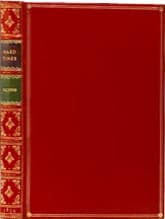Hard Times
 First edition
First editionFirst publication
1854
Literature form
Novel
Genres
Literary
Writing language
English
Author's country
England
Length
Approx. 175,000 words
Easy reading on difficult times
What's to like about Hard Times:
A lot. It's short, for a Dickens novel. It's accessible—anyone can read it without a great deal of learning and without getting lost in convoluted descriptions. It's vivid—the characters are sharp and memorable; the settings are quickly and strongly drawn. It's exciting—a great story, part mystery, part romance, part social satire. And it's moving. It's a great novel.
What's not to like?
There's a price to be paid for the lack of Dickens's usual wordiness. The characters and situation are perhaps too succinctly drawn. They tend to caricatures. Hard Times is closer to Dickens's shorter morality tales like A Christmas Carol than to his developed novels like David Copperfield or Great Expectations. While all his works have their comically exaggerated characters, this novel has less subtlety than most.
But it's a price we're happy to pay. Like I said, it's a great involving story.
Hard Times is also one of the great novels of social criticism. I hesitate to say it's a novel of social realism because Dickens is far too romantic a reformer to give up a happy ending of sorts. Nor does he issue a call for revolution to overthrow the injustices he exposes. Rather he asks us to find the solutions in our hearts. A humanist more than a politician. I won't get into now whether this should be entered on the positive or negative side of the ledger when assessing Dickens; it's just the way he is and what has made him beloved for nearly two centuries. We're better for having works such as Hard Times.
The injustices Dickens exposes in Hard Times are caused by the Industrial Revolution in the fictional and well-named Coketown. But he is not taking the side of the proletariat in fighting exploitation. Rather he is protesting the attempt to extend the mechanization of production to the forming of the human mind. He is protesting the replacement of the human spirit by market values.
The most memorable caricature is that of the schoolteacher Thomas Gradgrind, responsible for those famous opening lines expressing his pedagogical theory as the stuffing of children's heads with facts. Even the man's name shows his industrial inspiration and his utilitarian approach to forming the minds of the students under his care. (You can get a taste of this in the sample text of the second chapter.)
Of course Mr. Gradgrind is unsuccessful. In school, in larger society, as well as in his very family, his cold project is foiled by common folks, holding on to their old-fashioned, compassionate morality. And he himself is converted by the example of his daughter who languishes in a loveless marriage to the manufacturer Josiah Bounderby and is taken advantage of by the heartless politician James Harthouse.
A radical novel in its times
Despite what I've said about Dickens's irrepressible romanticism, Hard Times is one of his least sentimental novels. Particularly in the tragic story of Stephen Blackpool, who is falsely accused of robbery, Dickens is as hard-eyed as any modern realist.
Hard Times was condemned by many as a radical novel at the time, derided as "sullen socialism" by the prominent critic Thomas Macauley. But in some ways it is almost exactly the opposite. For Dickens's target is not capitalism so much as the utilitarian approach to social progress by which the greater good for the greatest number is determined by cold calculation. (Dickens himself was a real-life critic of radical utilitarians, of whom Gradgrind is thought to be a caricature.)
In the succeeding century, as Hard Times' views became common wisdom and, as real socialist literature appeared, Hard Times became seen as reformist without being dogmatic. The personal peccadilloes of its characters have come more to the fore, ahead of its political agenda, which if anything may be characterized as liberalism—or capitalism with a heart.
Today the novel stands as an engaging, inspiring human story with a sharp point, which is likely what Dickens intended.
— Eric

